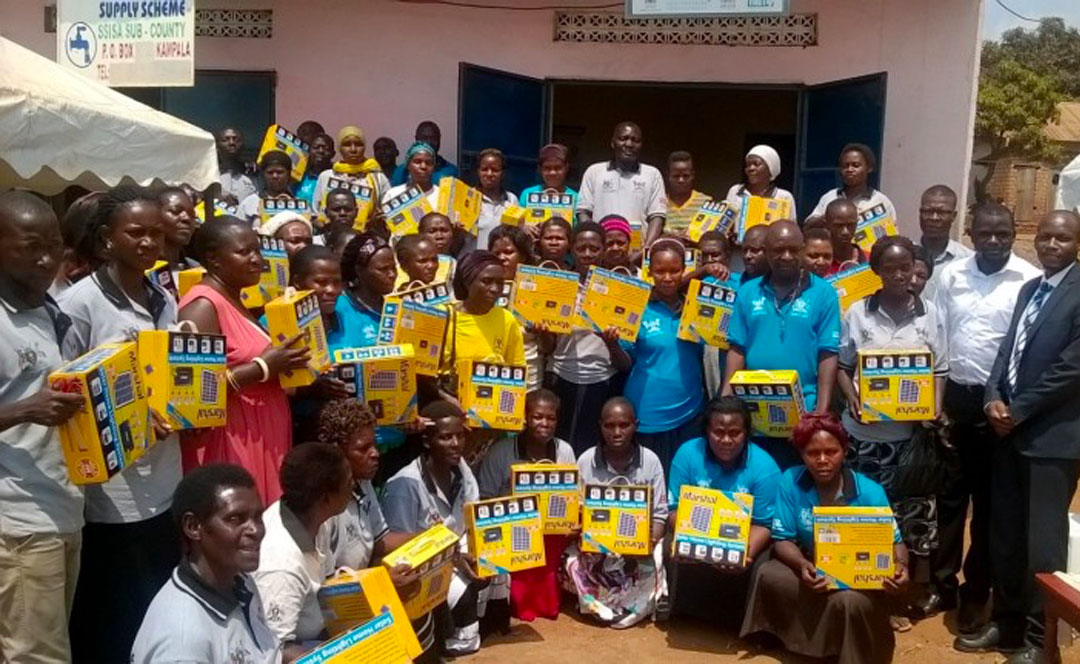
Makerere University School of Public Health (MakSPH) in collaboration with Nottingham Trent University (UK) through the project strengthening community health workers in Ssisa sub-county, Wakiso district supplied solar equipment to seventy five (75) Village Health Team (VHT) members. This was during an event held on 15th February 2016 at the project field offices in Nakawuka, Ssisa sub-county. The solar equipment are part of the motivation package for the VHTs in addition to t-shirts, umbrellas and gum-boots that they received earlier. These solar equipment were given to VHTs involved in Integrated Community Case Management of childhood illnesses (iCCM) living in areas without electricity. This equipment is to help them charge their mobile phones so as to facilitate their reporting under the mTrac system. In addition, the solar equipment will be used by the VHTs to light their houses.
The event was attended by local council leaders (LC I, II, III and V), district representatives, in-charges of the health centres in Ssisa sub-county, and staff of MakSPH. Representatives of the VHTs thanked MakSPH for supporting them in their work through training, non-financial incentives, and provision of motorcycles. They specifically thanked the project Principal Investigator Dr. David Musoke for his dedication and commitment to supporting rural communities in the district.
In his remarks, Dr. Musoke noted that all the 301 VHTs in the sub-county had been trained, 3 motorcycles had been provided which had greatly enhanced transportation of the VHTs, as well as delivered non-financial incentives to motivate them. He added that some of the milestones of the project included: VHTs that were inactive especially those not involved in iCCM had become actively engaged in their roles, VHTs had increased working together while performing their duties, and that motorcycles were helping in other health activities in the areas such as delivering medicines to the VHTs among others. He urged the VHTs to use the solar equipment appropriately so as to facilitate their work.
Mr. Abdullah Ali Halage from MakSPH while speaking at the function encouraged the VHTs to work together to improve the health of their people as was the case among the bare-footed doctors of China. He thanked the VHTs for the work they were doing and urged them to use the solar equipment well. Dr. John Ssempebwa, who represented the Dean of MakSPH, thanked the VHTs for allowing the School to work with them. He urged them to work hard for the good of the community, and use the solar equipment to improve the quality of life of the people of Ssisa sub-county. He also thanked Dr. Musoke for the tremendous work he is doing in the area.
The chief guest at the function, Mr. Matia Lwanga Bwanika, the Wakiso district LC V Chairperson thanked the VHTs for the service they are offering to the community. He told them that the kind of work they were doing was what earlier was referred to as community service in Buganda kingdom. He urged them to ensure high levels of team work in order to be able to impact the lives of the people. He also noted that solar energy is preferable to hydroelectric power that most people are using today, and called upon the VHTs to appropriately use the resources that MakSPH has given them to promote health in their villages. He thanked MakSPH for the efforts they are putting in to helping the people of Ssisa, and pledged to provide any support required by the School to continue working in the district. This project is supported by the Tropical Health & Education Trust (THET) as part of the Health Partnership Scheme, which is funded by the UK Department for International Development (DFID).

